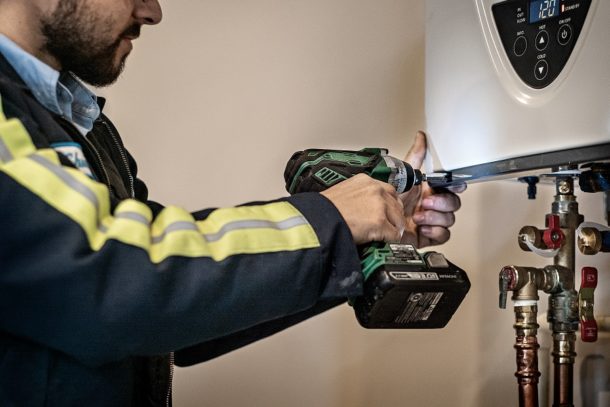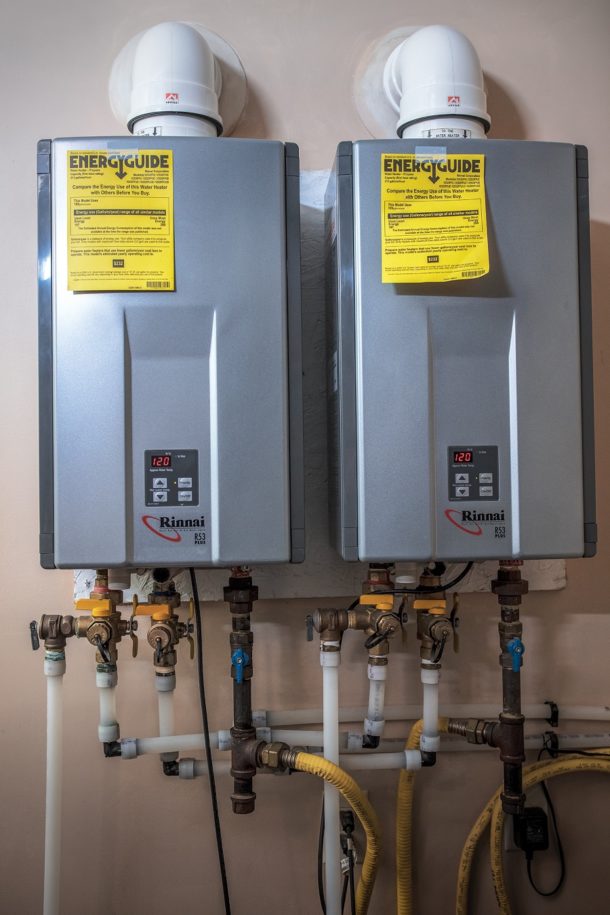Propane tankless systems are an efficient, affordable solution for any project
What is your customer’s biggest water heating concern? Running out of hot water? Rising utility costs? Environmental sustainability?
Builders, remodelers, and contractors can address any of these concerns by helping customers select a high-efficiency propane tankless system. Tankless technology is becoming increasingly popular because of its versatility, convenience, and efficiency in both new construction projects and as retrofits to existing systems. These systems offer reduced energy costs, a long service life, and high volumes of hot water — and propane units provide a level of performance that electric and heating oil systems just can’t match.
But there are still some common misconceptions that can keep professionals and their clients from upgrading to a tankless water heater.

Here are four common tankless myths, debunked:
MYTH: Tankless water heaters are too expensive.
For some customers, it’s hard to look past the upfront cost of a high-efficiency tankless water heater, but it’s important to consider the system’s annual cost of ownership (ACO). Tankless water heaters reduce energy costs by up to 50 percent compared with storage tank water heaters and eliminate standby energy loss from the tank, as well as the unnecessary expense of heating water when it’s not being used — which ultimately reduces water heating bills. High-efficiency units pay for themselves in just a few short years — which is a big win for contractors and their customers. Big picture, they’re a smart investment. Plus, there are great rebates available to help bring the costs down.
In a 2015 comprehensive analysis of residential water heating systems, two propane tankless systems were found to offer the lowest ACO in eight out of nine scenarios covering different climate and housing types when compared with electric water heaters, heat pump water heaters, and heating oil systems. Propane tankless’ cost-effectiveness stems from the system’s low annual energy costs and long service life of roughly 20 years.
MYTH: Tankless water heating requires natural gas.
By incorporating propane into a project, construction professionals and contractors can give their clients the same luxury, performance, efficiency of a natural gas tankless system — no matter where the house is located. There are still a lot of builders that are building in rural areas where the natural gas line isn’t available and instead using electric tanks. They are simply not thinking of propane tankless just because it’s not as common.
What many builders and contractors may not realize is how construction-friendly this energy source is. Propane is used much like natural gas and is easy to incorporate into a project. Plus, with propane, professionals and their customers aren’t at the mercy of a public utility. Meanwhile, performance is never sacrificed. Propane tankless water heaters provide an endless supply of hot water, averaging about 222 gallons per hour, compared with an average first-hour delivery rating of just 62 gallons per hour for electric storage tank models.
MYTH: Tankless systems require complicated venting.
Venting for propane tankless systems is flexible, easy, and inexpensive. Given the unit’s compact size and direct-vent design, they can be installed in closets, tight spaces, and even outdoors. Upgrading from an electric tank to an interior propane tankless system may require a little more planning, but high-efficiency units can be vented straight through the wall with inexpensive PVC pipe.
MYTH: Tankless won’t work with well water.
Tankless is a great option for customers, whether they use city water or well water. When a water heater heats water, a small amount of scale can form on the heat exchanger, so periodic flushing is required to keep tankless water heaters functioning at their best. Homes with harder water or more usage will have more scale, but city water versus well water won’t affect this. Many modern tankless systems will notify the homeowner when they need to be flushed or can even be set up to notify a technician when maintenance is required. Regardless of the water source, a water softener can greatly reduce the scale created, allowing for much longer intervals between flushing. And maintenance is key — if properly maintained, propane tankless units last twice as long as traditional tank systems.
Don’t let customers settle when it comes to water heating performance for their home — and for many projects, this means choosing the limitless hot water delivery and efficiency of a propane tankless water heater. Visit Propane.com/Water-Heating to learn more.
 Bryan Cordill is director of residential and commercial business development for the Propane Education & Research Council. He can be reached at bryan.cordill@propane.com.
Bryan Cordill is director of residential and commercial business development for the Propane Education & Research Council. He can be reached at bryan.cordill@propane.com.





Join the conversation: